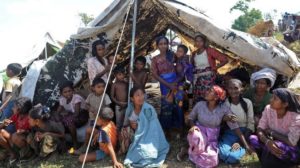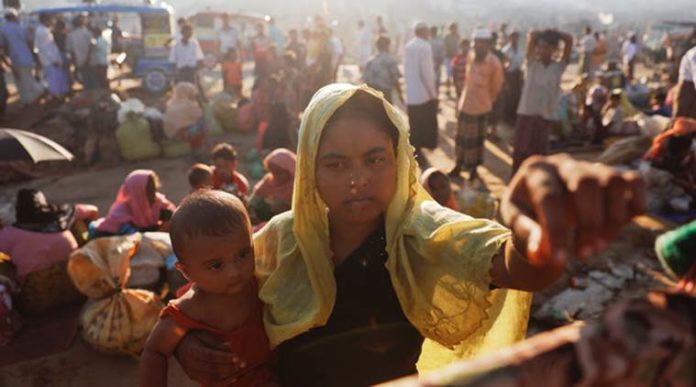Bangladesh is planning to introduce voluntary sterilisation in its overcrowded Rohingya camps, where nearly a million refugees are fighting for space, after efforts to encourage birth control failed. More than 600,000 Rohingya have arrived in Bangladesh since a military crackdown in neighbouring Myanmar in August triggered an exodus, straining resources in the impoverished country.
The latest arrivals have joined hundreds of thousands of Rohingya refugees who fled in earlier waves from Myanmar’s Rakhine state, where the stateless Muslim minority has endured decades of persecution.
Most live in desperate conditions with limited access to food, sanitation or health facilities and local officials fear a lack of family planning could stretch resources even further. Pintu Kanti Bhattacharjee, who heads the family planning service in the district of Cox’s Bazar where the camps are based, said there was little awareness of birth control among the Rohingya.
“The whole community has been deliberately left behind,” he told AFP, citing a lack of education in Myanmar, where the Rohingya are viewed as illegal immigrants and denied access to many services.
Bhattacharjee said large families were the norm in the camps, where some parents had up to 19 children and many Rohingya men have more than one wife. District family planning authorities have launched a drive to provide contraception, but say they have so far managed to distribute just 549 packets of condoms among the refugees, who are reluctant to use them.
They have asked the government to approve a plan to launch vasectomies for Rohingya men and tubectomies for women, Bhattacharjee told AFP. But they are likely to face an uphill struggle.
Many of the refugees told AFP they believed a large family would help them survive in the camps, where access to food and water remains a daily battle and children are often sent out to fetch and carry supplies. Others had been told contraception was against the tenets of Islam. Farhana Sultana, a family planning volunteer who works with Rohingya refugees in the camps, said many of the women she spoke to believed birth control was a sin.
“In Rakhine they did not go to family planning clinics, fearing the Myanmar authorities would give medicine that harms them or their children,” Sultana said. Volunteers said they struggled to sell the benefits of birth control to Rohingya women, most of whom came to them for advice on pregnancy complications or help with newborns.
Sabura, a mother of seven, said her husband believed the couple could support a large family. “I spoke to my husband about birth control measures. But he is not convinced. He was given two condoms but he did not use them,” she told AFP. “My husband said we need more children as we have land and property (in Rakhine). We don’t have to worry to feed them,” she said.

Bangladesh has for years run a successful domestic sterilisation programme, offering 2,300 taka ($28) and a traditional lungi garment to each man who agrees to undergo the procedure. Every month 250 people undergo sterilisation in the border town of Cox’s Bazar. But performing the permanent procedure on non-Bangladeshi nationals requires final approval from a committee headed by the health minister.
The idea is particularly contentious given the sensitivity of the issue in Myanmar. The widespread perception that the Rohingya population is mushrooming is a key source of the tensions that have spiralled in recent months. No official data is available on birth rates among the Rohingya, who are excluded from the census in Myanmar.
But many of the ethnic Rakhine Buddhists accused of taking part in attacks on Rohingya villages that have driven hundreds of thousands into Bangladesh say they fear being displaced by the Muslim minority. The Rohingya face official restrictions on the number of children they can have in Myanmar, although this has not been widely enforced. Rights activists working in the camps in Bangladesh said some believed pregnancy provided protection against rape or other attacks in Myanmar, where the military has been accused of sexual violence against Rohingya women and girls.
“Some of them told us that if a woman was pregnant, she had less chance of being targeted by the military or attackers.”
Bangladesh officials say some 20,000 Rohingya women are pregnant and 600 have given birth since arriving in Bangladesh, though this may be an underestimate as many births take place with no formal medical help. “Sterilisation of the males is the best way to control the population,” said Bhattacharjee. “If a man is sterilised, he cannot father a child even if he marries four or five times.”
BY:AFP

Readers like you, make ESHADOOT work possible. We need your support to deliver quality and positive news about India and Indian diaspora - and to keep it open for everyone. Your support is essential to continue our efforts. Every contribution, however big or small, is so valuable for our future.












What is the role of United Nation.Almost a million people made homeless and we are not hearing what action against such rulers are being taken. Many Asians suffered when they were thrown out of Uganda penniless.Recently a film Airlift told us more than 1.8 millions Asians were thrown out of the middle east.WE all need to think. Keep the religions out of this thinking and only think if you was the one suffering in this way.
Rohingya Muslims are irresponsible parents and as the local Buddhists believe such rampant breeding without having to worry about who cares for their kids is one of the reasons why they’re pushed out.The efforts by Bangladesh government of voluntary sterilisation is the right step perhaps to be followed by authorities world over
A religious fervour to increase their own population at the cost of adequate services available to others is selfish
A similar phenomenon is happening at places near us here in the U.K. So beware
Why should one not question their motives-the first Xmas when the Syrian refugees arrived in Germany were many attack’s in local females No sympathy by UN will change these people’s perception, that of grabbing for free and swamp life of other host societies
Why is no one talking about plight of Kashmiri pundits and daily persecution of minority Hindus and Christians on Pakistan and Bangladesh? Where was un then?
Bharat Parmar, a very good post. We all must speak up, often and every where. We must tell the world what is happening and what will happen.
For Rohingyas Muslims the sterilization is the best solution.
Knowing their History Bangla desh is the right country for them to be settled permanently with U.N. help.
Those who have come to India should join their brothers and sisters in Bangladesh.